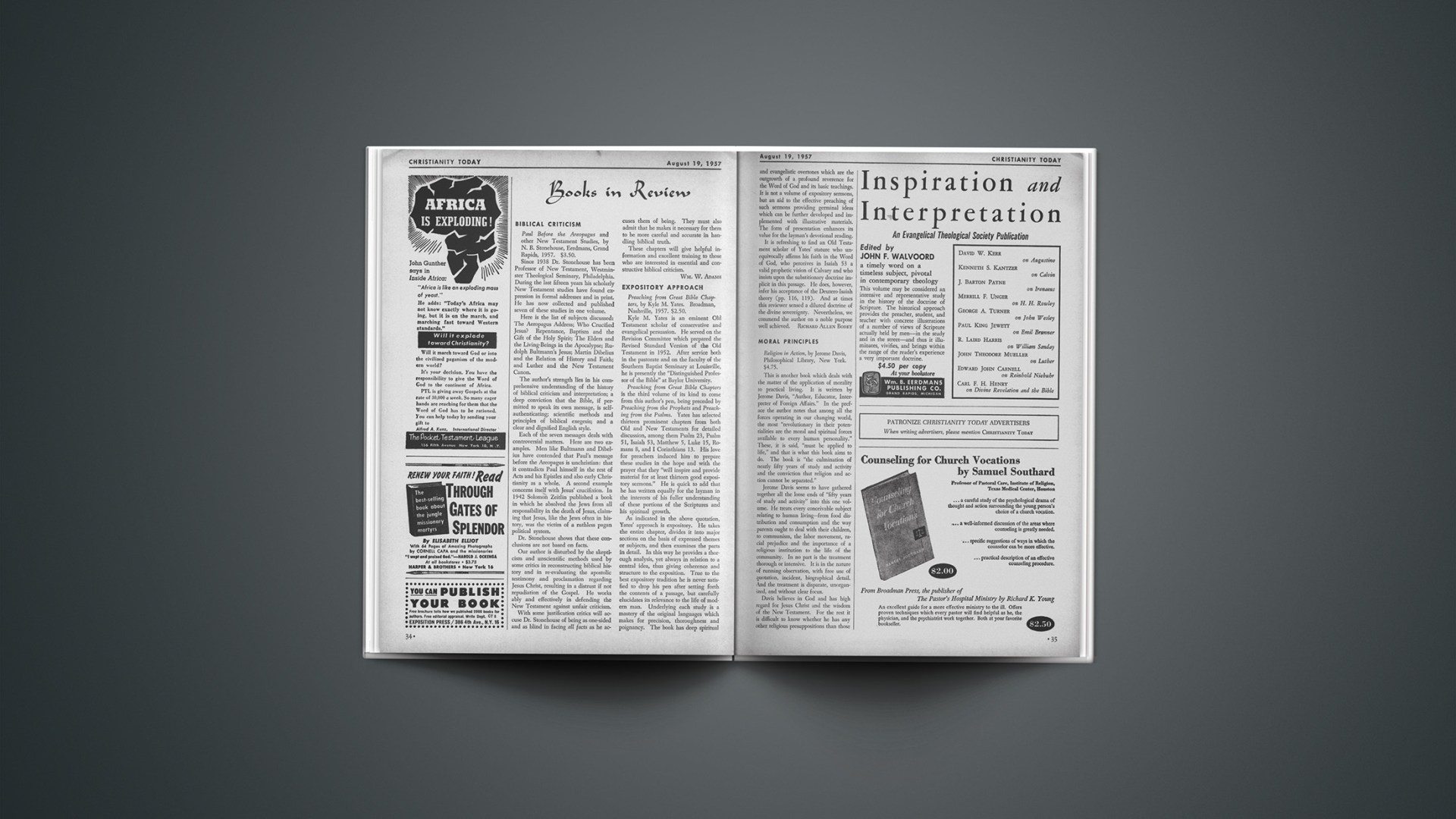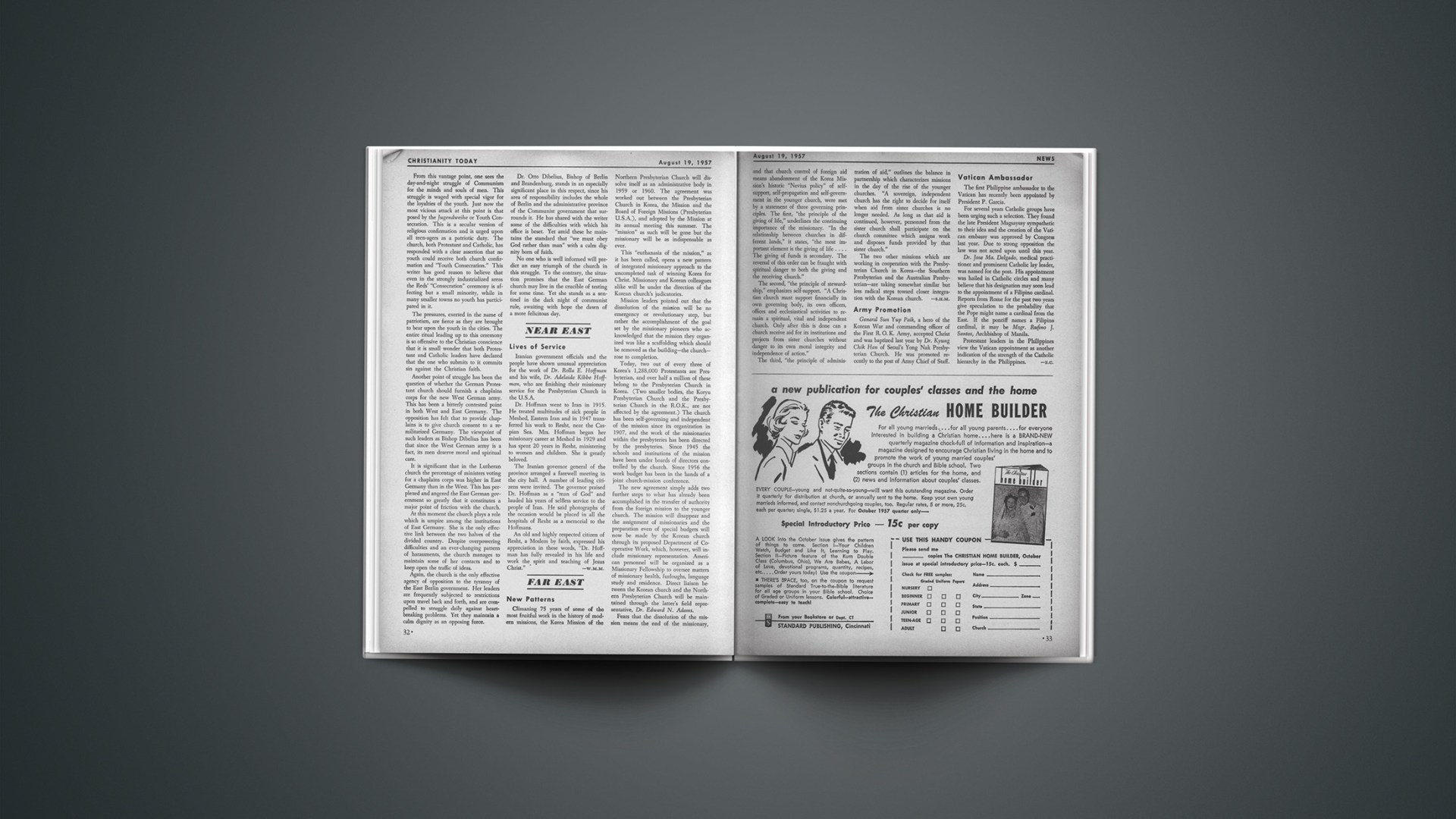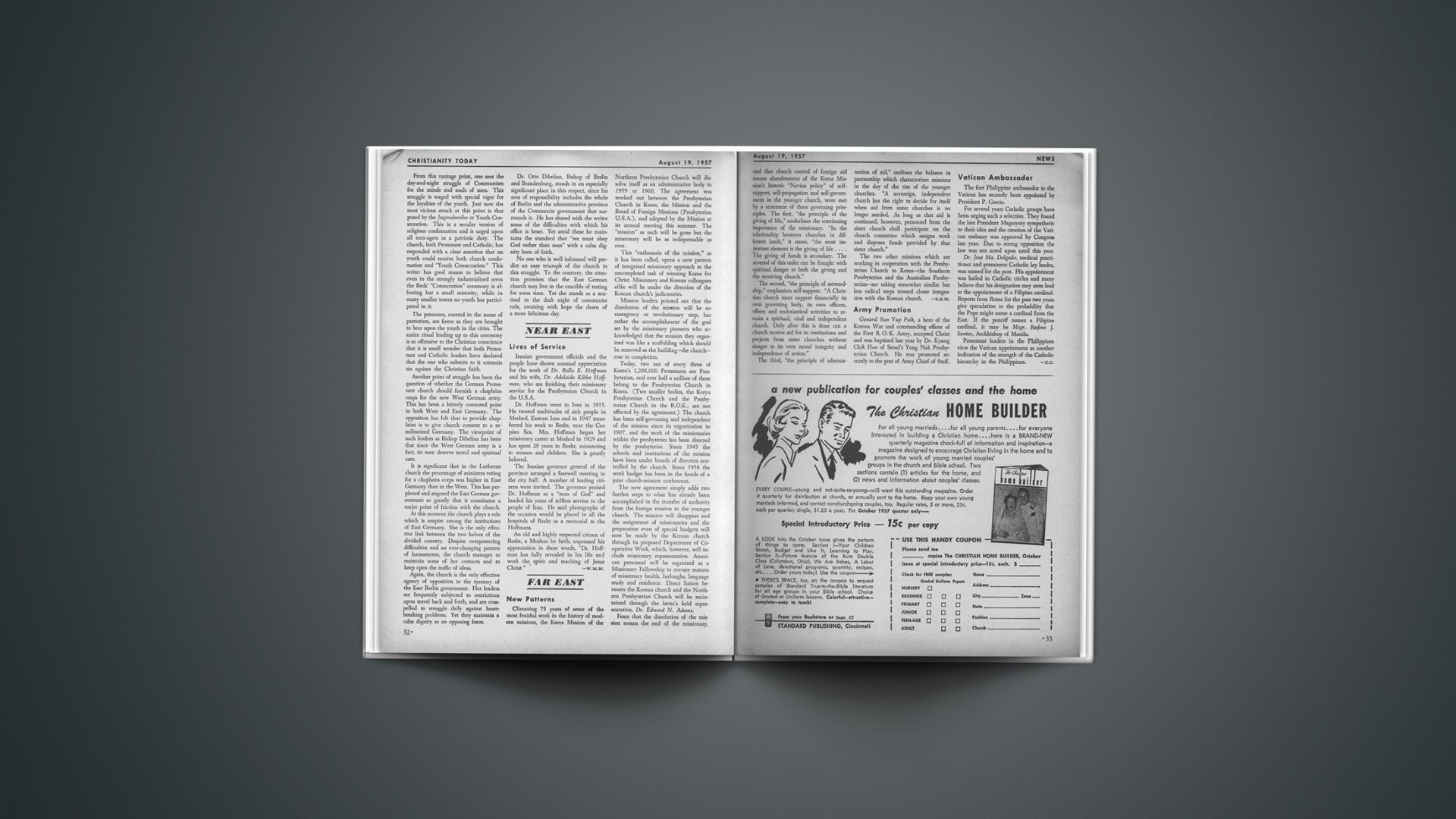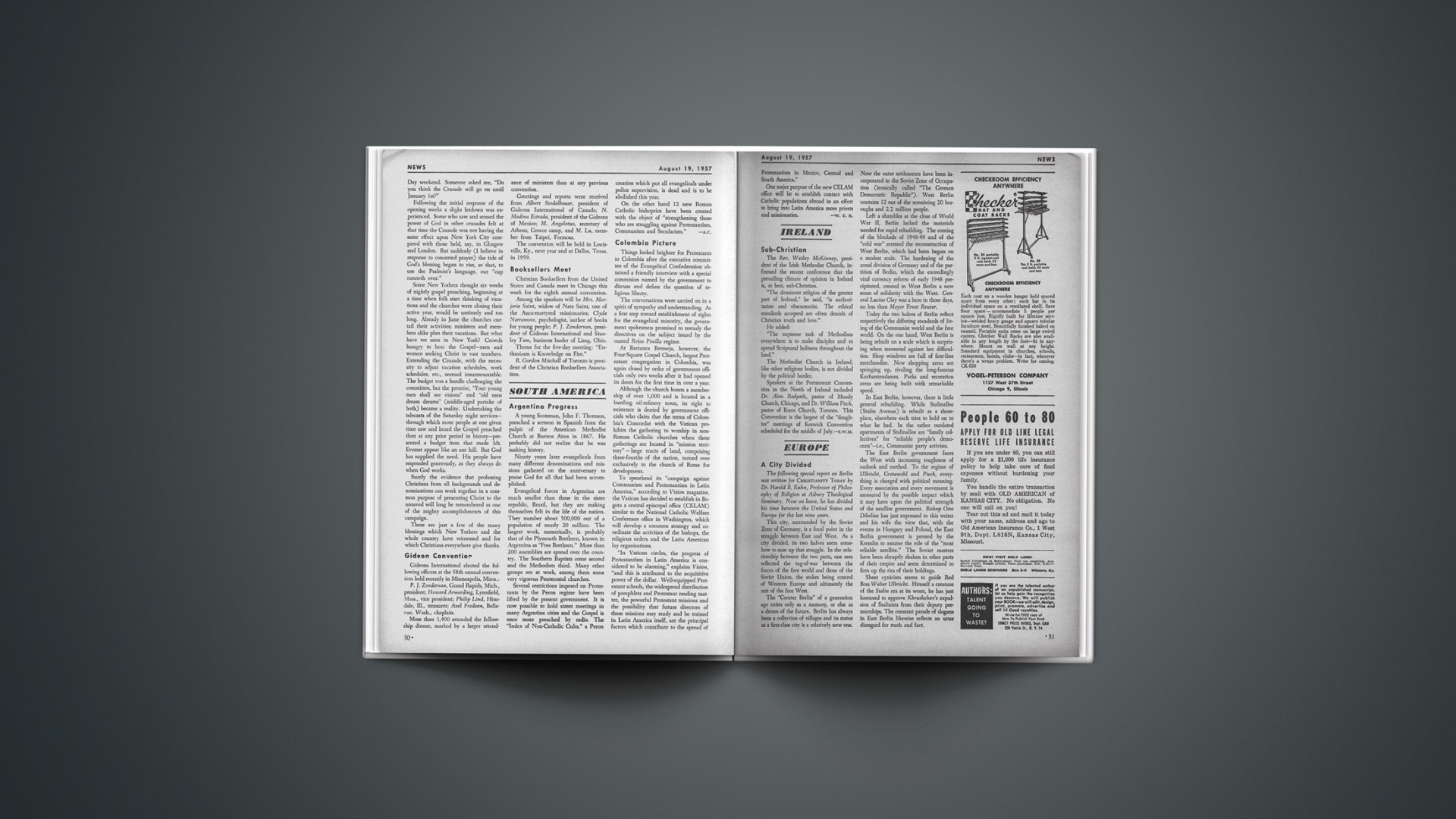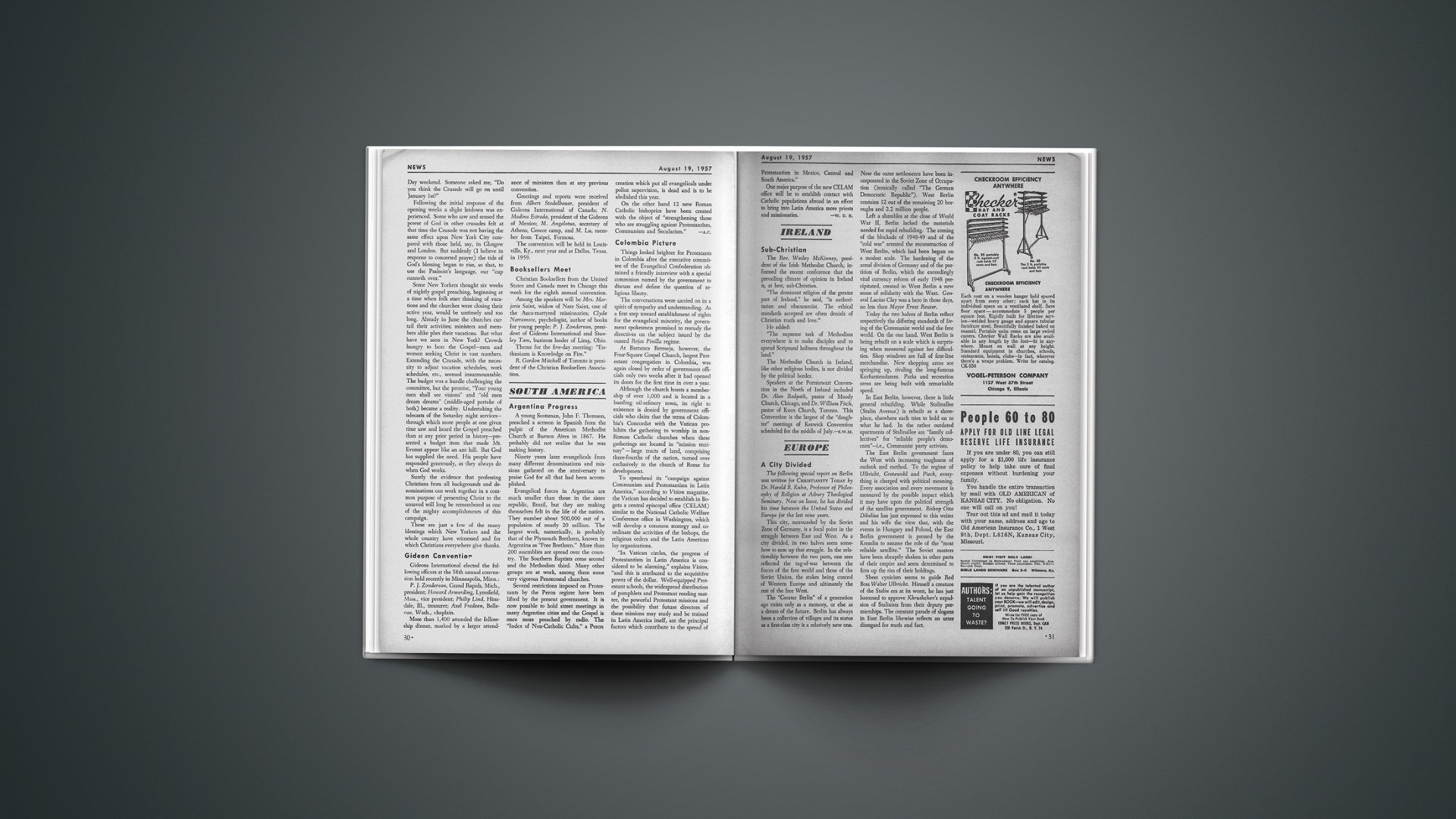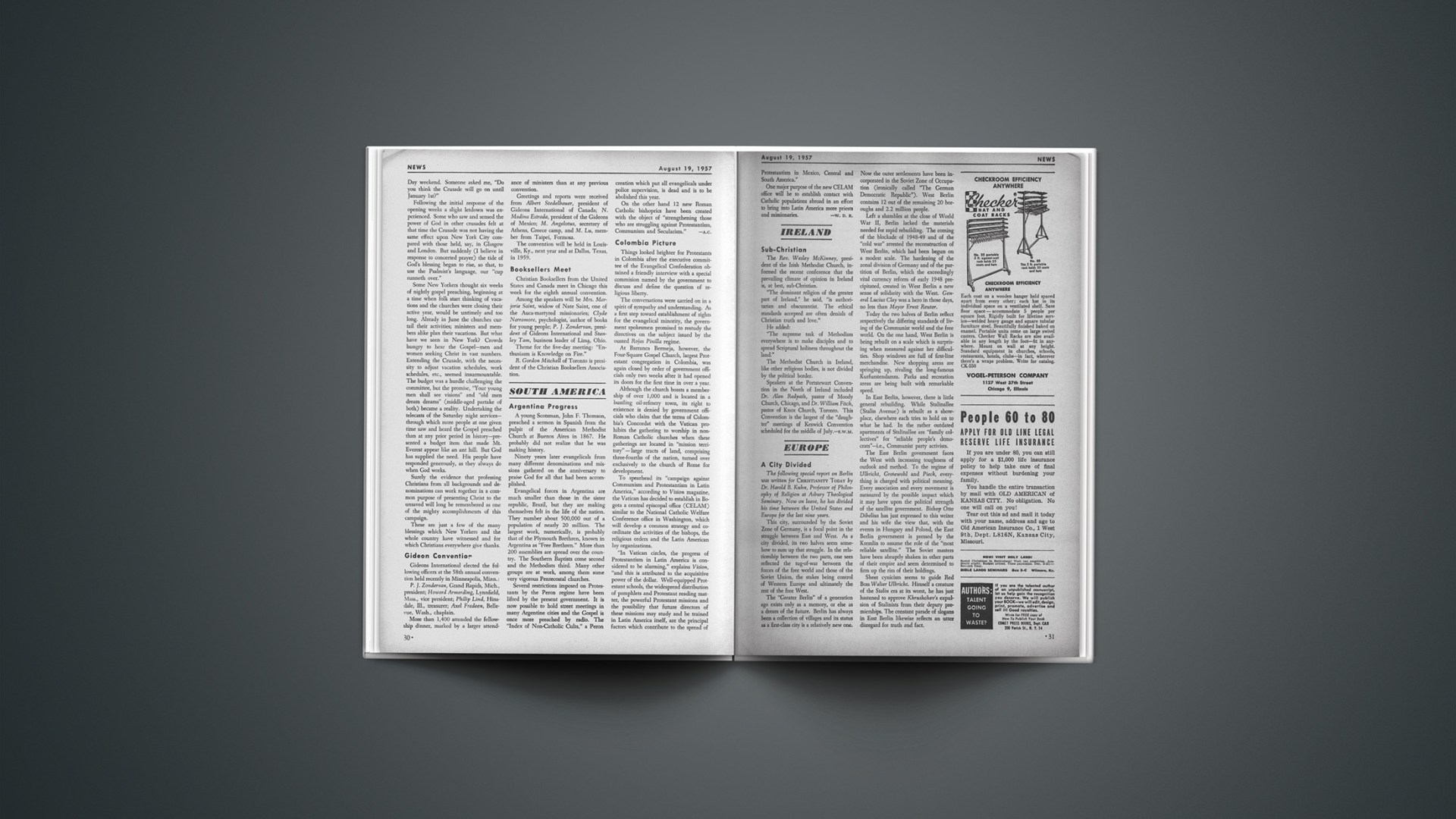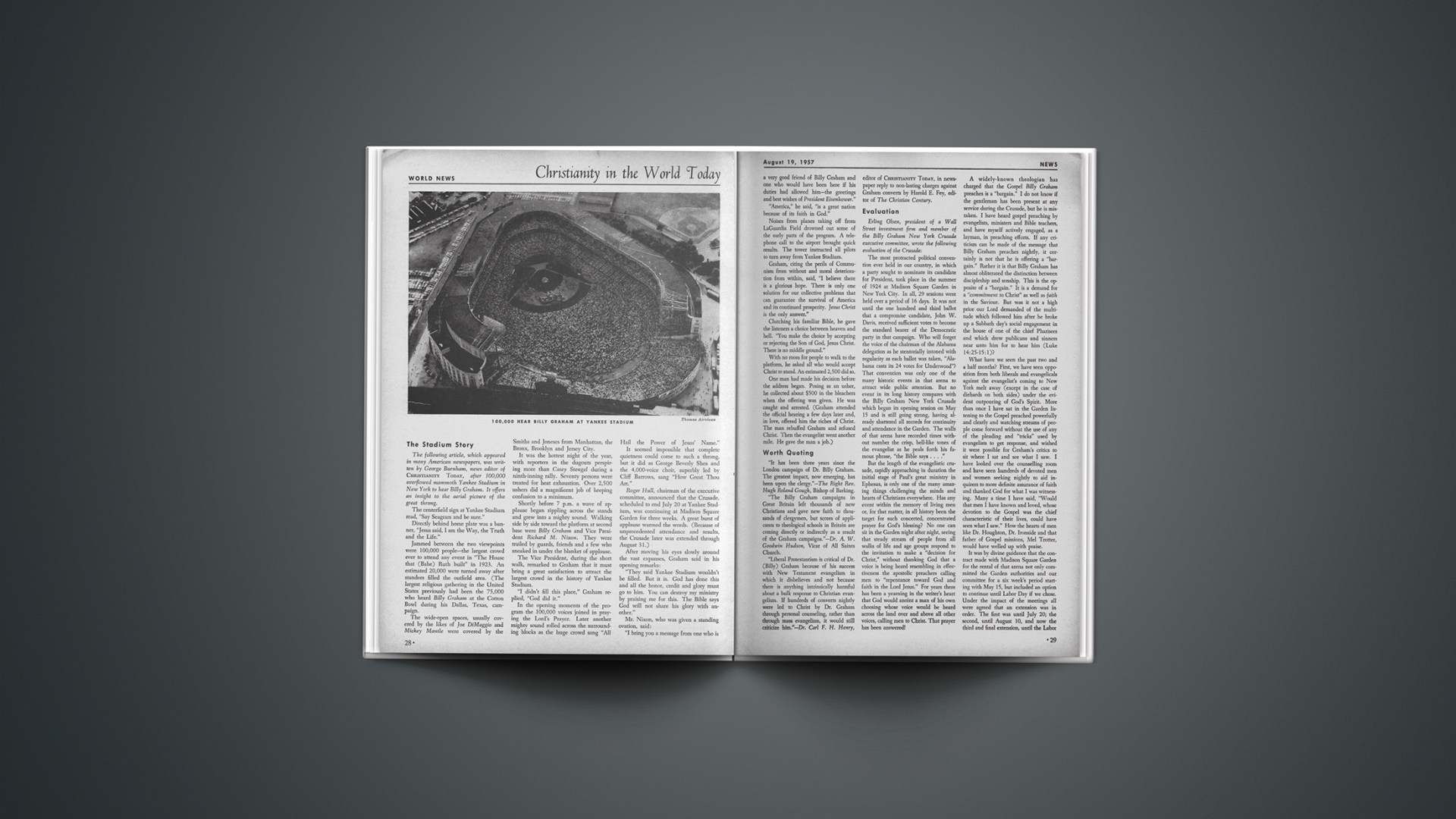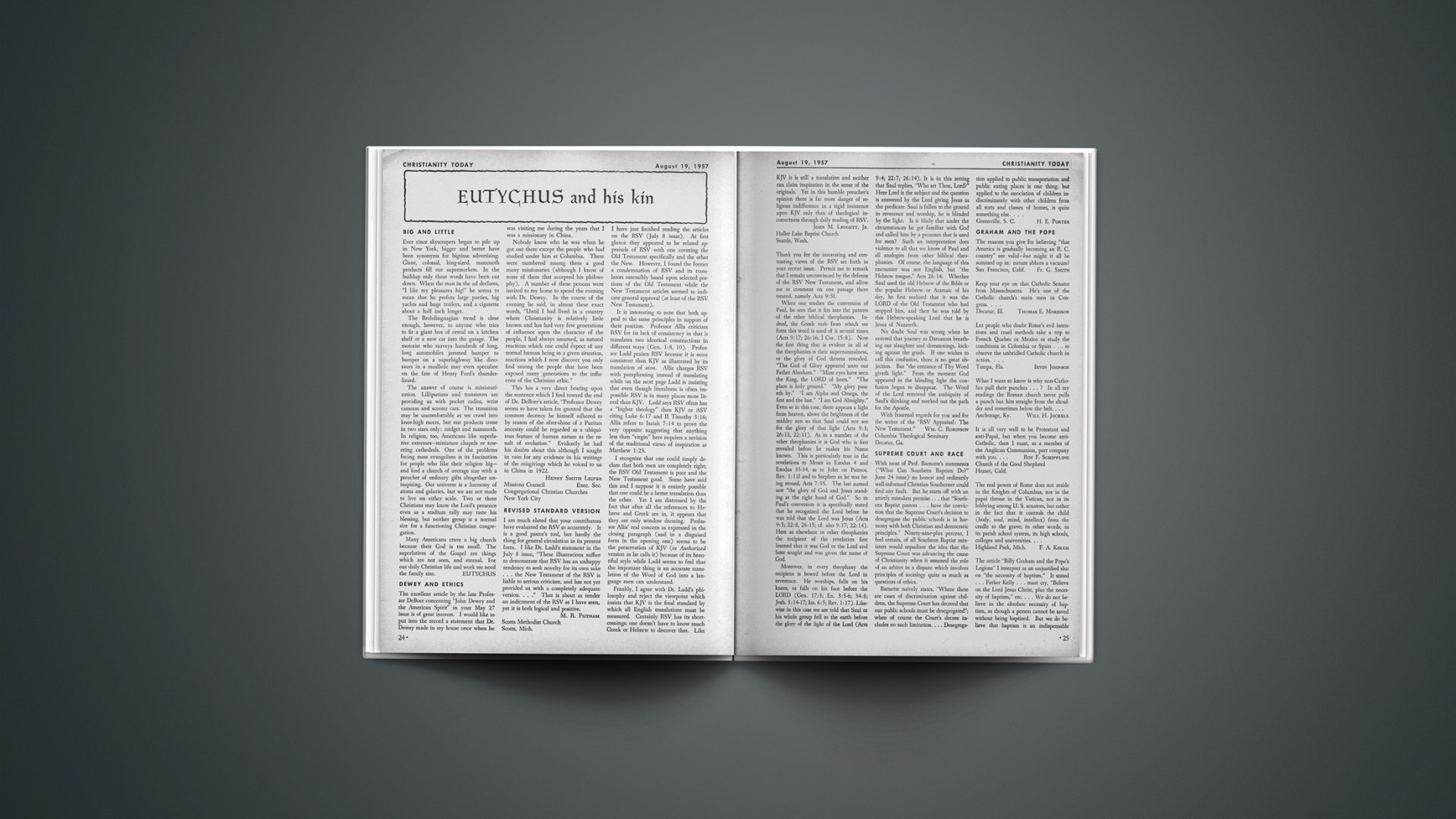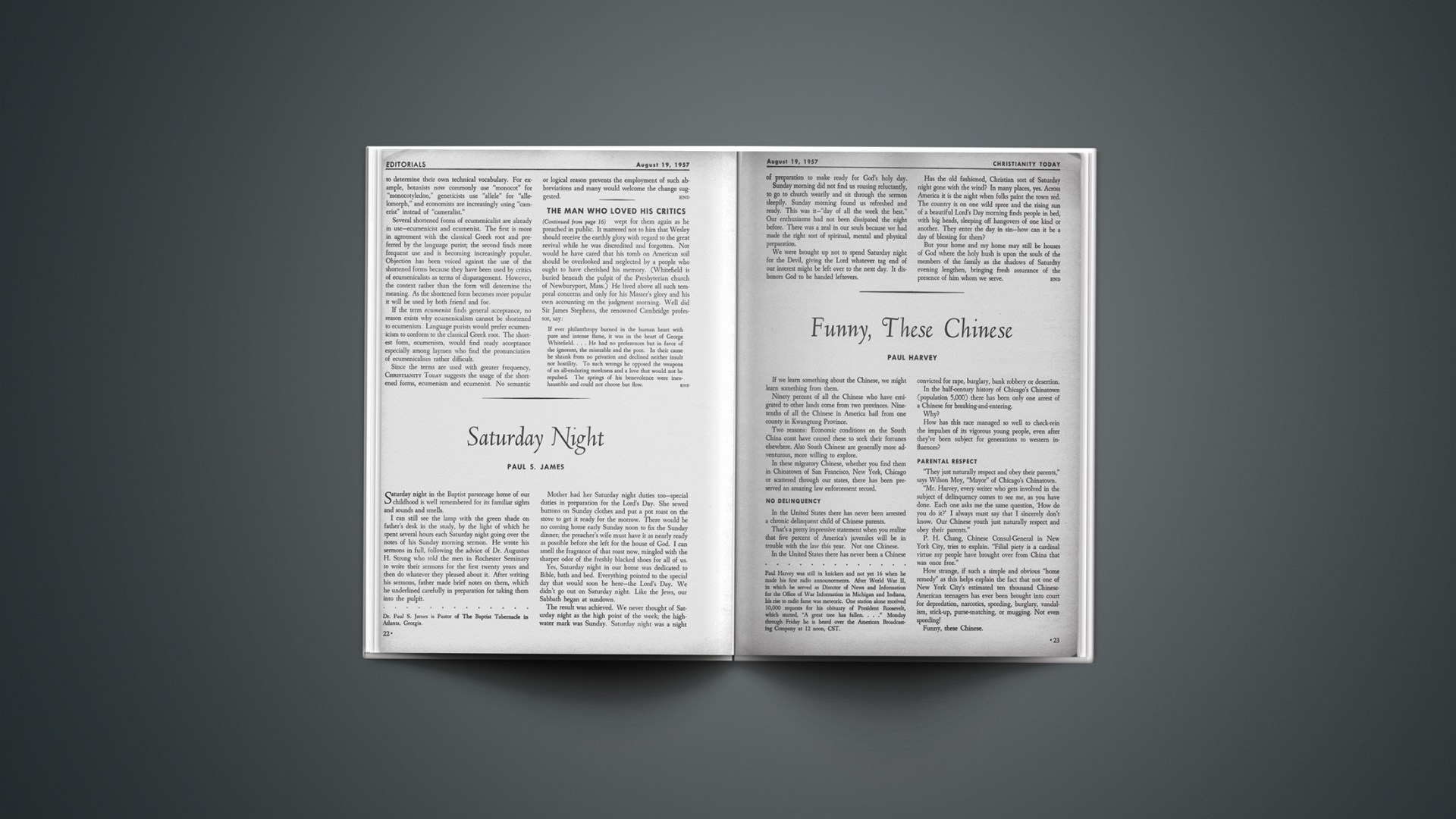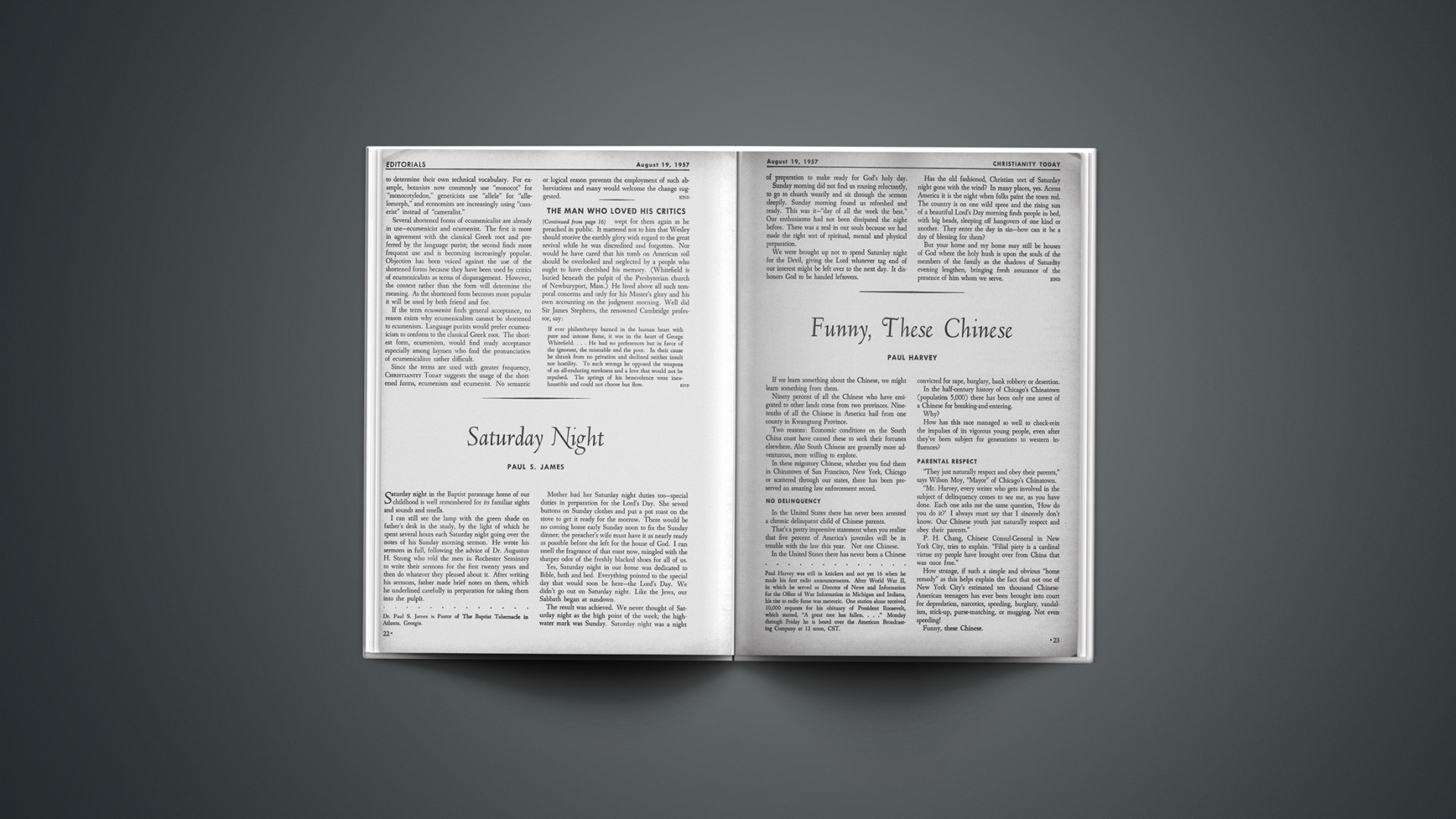Biblical Criticism
Paul Before the Areopagus and other New Testament Studies, by N. B. Stonehouse, Eerdmans, Grand Rapids, 1957. $3.50.
Since 1938 Dr. Stonehouse has been Professor of New Testament, Westminster Theological Seminary, Philadelphia. During the last fifteen years his scholarly New Testament studies have found expression in formal addresses and in print. He has now collected and published seven of these studies in one volume.
Here is the list of subjects discussed: The Aeropagus Address; Who Crucified Jesus? Repentance, Baptism and the Gift of the Holy Spirit; The Elders and the Living-Beings in the Apocalypse; Rudolph Bultmann’s Jesus; Martin Dihelius and the Relation of History and Faith; and Luther and the New Testament Canon.
The author’s strength lies in his comprehensive understanding of the history of biblical criticism and interpretation; a deep conviction that the Bible, if permitted to speak its own message, is self-authenticating; scientific methods and principles of biblical exegesis; and a clear and dignified English style.
Each of the seven messages deals with controversial matters. Here are two examples. Men like Bultmann and Dibelius have contended that Paul’s message before the Areopagus is unchristian: that it contradicts Paul himself in the rest of Acts and his Epistles and also early Christianity as a whole. A second example concerns itself with Jesus’ crucifixion. In 1942 Solomon Zeitlin published a book in which he absolved the Jews from all responsibility in the death of Jesus, claiming that Jesus, like the Jews often in history, was the victim of a ruthless pagan political system.
Dr. Stonehouse shows that these conclusions are not based on facts.
Our author is disturbed by the skepticism and unscientific methods used by some critics in reconstructing biblical history and in re-evaluating the apostolic testimony and proclamation regarding Jesus Christ, resulting in a distrust if not repudiation of the Gospel. He works ably and effectively in defending the New Testament against unfair criticism.
With some justification critics will accuse Dr. Stonehouse of being as one-sided and as blind in facing all facts as he accuses them of being. They must also admit that he makes it necessary for them to be more careful and accurate in handling biblical truth.
These chapters will give helpful information and excellent training to those who are interested in essential and constructive biblical criticism.
WM. W. ADAMS
Expository Approach
Preaching from Great Bible Chapters, by Kyle M. Yates. Broadman, Nashville, 1957. $2.50.
Kyle M. Yates is an eminent Old Testament scholar of conservative and evangelical persuasion. He served on the Revision Committee which prepared the Revised Standard Version of the Old Testament in 1952. After service both in the pastorate and on the faculty of the Southern Baptist Seminary at Louisville, he is presently the “Distinguished Professor of the Bible” at Baylor University.
Preaching from Great Bible Chapters is the third volume of its kind to come from this author’s pen, being preceded by Preaching from the Prophets and Preaching from the Psalms. Yates has selected thirteen prominent chapters from both Old and New Testaments for detailed discussion, among them Psalm 23, Psalm 51, Isaiah 53, Matthew 5, Luke 15, Romans 8, and 1 Corinthians 13. His love for preachers induced him to prepare these studies in the hope and with the prayer that they “will inspire and provide material for at least thirteen good expository sermons.” He is quick to add that he has written equally for the layman in the interests of his fuller understanding of these portions of the Scriptures and his spiritual growth.
As indicated in the above quotation, Yates’ approach is expository. He takes the entire chapter, divides it into major sections on the basis of expressed themes or subjects, and then examines the parts in detail. In this way he provides a thorough analysis, yet always in relation to a central idea, thus giving coherence and structure to the exposition. True to the best expository tradition he is never satisfied to drop his pen after setting forth the contents of a passage, but carefully elucidates its relevance to the life of modern man. Underlying each study is a mastery of the original languages which makes for precision, thoroughness and poignancy. The book has deep spiritual and evangelistic overtones which are the outgrowth of a profound reverence for the Word of God and its basic teachings. It is not a volume of expository sermons, but an aid to the effective preaching of such sermons providing germinal ideas which can be further developed and implemented with illustrative materials. The form of presentation enhances its value for the layman’s devotional reading.
It is refreshing to find an Old Testament scholar of Yates’ stature who unequivocally affirms his faith in the Word of God, who perceives in Isaiah 53 a valid prophetic vision of Calvary and who insists upon the substitionary doctrine implicit in this passage. He does, however, infer his acceptance of the Deutero-Isaiah theory (pp. 116, 119). And at times this reviewer sensed a diluted doctrine of the divine sovereignty. Nevertheless, we commend the author on a noble purpose well achieved.
RICHARD ALLEN BODEY
Moral Principles
Religion in Action, by Jerome Davis, Philosophical Library, New York. $4.75.
This is another book which deals with the matter of the application of morality to practical living. It is written by Jerome Davis, “Author, Educator, Interpreter of Foreign Affairs.” In the preface the author notes that among all the forces operating in our changing world, the most “revolutionary in their potentialities are the moral and spiritual forces available to every human personality.” These, it is said, “must be applied to life,” and that is what this book aims to do. The book is “the culmination of nearly fifty years of study and activity and the conviction that religion and action cannot be separated.”
Jerome Davis seems to have gathered together all the loose ends of “fifty years of study and activity” into this one volume. He treats every conceivable subject relating to human living—from food distribution and consumption and the way parents ought to deal with their children, to communism, the labor movement, racial prejudice and the importance of a religious institution to the life of the community. In no part is the treatment thorough or intensive. It is in the nature of running observation, with free use of quotation, incident, biographical detail. And the treatment is disparate, unorganized, and without clear focus.
Davis believes in God and has high regard for Jesus Christ and the wisdom of the New Testament. For the rest it is difficult to know whether he has any other religious presuppositions than those of a moral God, a moral man, and a moral order that needs attention from moral man who acts under the stimulus and guidance of a moral God. Here is an example of the case for religion in the community, whether that of the “church or synagogue.” A wealthy atheist tried to establish a community without a church. To it gravitated the agnostics, atheists and criminal elements. Families not too religious wanted a church or synagogue to which they could turn, if only for the sake of their children, or perhaps for the social activities of church life. Not finding either, but only saloons and gambling places, the people moved away. Finally the wealthy real estate owner decided, “even though he did not believe in God, that he simply must have a church or a synagogue in the community if he wished to sell his lots advantageously. So in the end he donated land for a church” (pp. 219, 220).
Davis’ discussion of the application of moral principles to everyday living would have been more effective if his treatment were more sharply delineated and his objectives more clearly defined. And it would have been immensely more helpful if he really had a religion (instead of a body of common sense moral counsels) to apply to life.
GEORGE STOB
More Than Bombs
Atoms for the World, by Laura Fermi, The University of Chicago Press, Chicago. $3.75.
This book is for those who like their reading laced with the unusual and for those interested in the social impact of science. Written by the widow of the atomic physicist, Enrico Fermi, it is an account of the first International Conference on the Peaceful Uses of Atomic Energy held at Geneva in 1955. While a vast literature of a technical sort has been written for and about this venture, this is the only lay description in book form intended for an audience “whose interest is probably half way between that of the delegates and that of the uninterested public.”
Two years ago, seventy-three nations met in this unique event, held under the direction of the United Nations. It was intended to provide a place for discussion and publicity of the possible uses of atomic energy for peaceful pursuits. It was intended, too, to provide those social contacts between the scientists of diverse nations so necessary for the advancement of science. In both the success was remarkable—particularly so because of the friendly participation of the Communist bloc. The writer, realizing that so worthwhile an event deserved popular description, has excelled in her task, painting admirably and with keen feeling the details, discussions, ideals and ideas behind such a technical venture. We are taken from laboratory to display and lecture to conversation but also from frustration to fulfillment and from the individual to the community of nations; all with delightful and informative ease.
Today, the initial success is manifest in another similar conference planned in the same city for next year. It is also shown in recent ratification by the governments of a number of countries (including Russia and the United States) of the statute creating an international agency on the peaceful uses of atomic energy. Certainly one may question possible outworkings of the latter plan and one may be somewhat skeptical of the dreams of universal peace through science implicit behind both the conference and the agency. One recalls Max Born, the famous German theoretical physicist, recently writing, “In 1921 I believed … the unambiguous language of science to be a step towards a better understanding between human beings. In 1951 I believed none of [this].… Although physicists understood one another well enough across all national frontiers they had contributed nothing to a better understanding of nations, but had helped in inventing and applying the most horrible weapon of destruction” (Physics in My Generation). But with all this, our book does describe the inception of something new—an attempt to use the atom on the international scene for more than bombs. It may foretell greater social participation by the scientific community. It cannot demonstrate that international politics, and even applied science, will not continue to be used for the greed of the few rather than the good of the many.
THOMAS H. LEITH
Natural Development
Principalities and Powers, by G. B. Caird. Oxford University Press, London, $2.40.
Interest in biblical theology is on the increase today. This volume, a study in Pauline theology, is an investigation of that Apostle’s teaching concerning principalities and powers. It reproduces the Chancellor’s Lectures for 1954 delivered at Queen’s University, Ontario, by the Professor of New Testament Language and Literature at McGill University.
True to the task of biblical theology the first three chapters trace the history of Jewish beliefs which contributed to Paul’s demonology. The fourth and final chapter seeks to show in what manner Paul envisaged the Cross as the victory over principalities and powers. Among other things the author concludes that principalities and powers include the powers of state, that the history of the Law which was given and guarded by angels resembles that of Satan himself, and that the victory of the Cross is through revelation, identification and obedience.
While the book is fairly complete as far as the analysis of Pauline teaching is concerned, it leaves much to be desired theologically. In his introduction the author claims that his responsibility is mainly descriptive, which responsibility he has discharged well; but his denial that the consideration of such questions as Does evil exist? Are there personal powers of evil? What is meant by “personal”? are a part of his task is open to serious question. Biblical theology is concerned not only with what was written but also with the thought in the mind of the writer which, under the guidance of the Holy Spirit, produced what was written. Certainly the answers to such questions which the author disclaims as part of his task are essential to the unveiling of Pauline thought in these areas.
In spite of this disavowal of responsibility the author in the course of his discussion does answer some of these questions, and it is these answers which make the work theologically inadequate. For instance, he denies the personal character of Satan. Too, and more basic, the author considers Paul’s ideas a result of natural development from his Jewish and Hellenistic background which ideas are set forth entirely in mythological language. This does not leave much room for Paul’s thought and writing to be moulded by revelation, nor does it predicate real substantial existence of these spirit beings which assume such a large place in Pauline theology.
CHARLES C. RYRIE
Teen-Age Problems
For Teen-Agers Only, by Frank Howard Richardson, M. D., Tupper and Love, New York, 1957. $2.95.
The market is being flooded with books having to do with the psychological approach to the various age groups, so much so that in many instances the psychiatrist’s couch has been substituted for the mourners’ bench.
When a physician who is a recognized authority in the field of child psychology is also a Christian it is fortunate that he is further gifted with the ability to write. For Teen-Agers Only is a book Christian parents can safely put in the hands of their own children faced with mounting teen-age problems, for it is sane, wholesome and frank.
One of the problems of young people today is that of “going steady,” with all of the emotional as well as physiological factors which may be involved. In this book Dr. Richardson, using hypothetical cases and names and a dialogue method, keeps the interest of the reader and makes one feel as though he were participating in the discussions.
Heartily recommended.
L. NELSON BELL
Competent Guide
Commentary on the Gospel of Mark, by Joseph Addison Alexander. Zondervan, Grand Rapids. $5.95.
Joseph Addison Alexander, son of the illustrious Archibald Alexander, who organized Princeton Theological Seminary in 1812, taught in the same seminary almost continuously from 1830 to 1860, the year of his death. His long teaching career covered most of the departments of the theological discipline. He was a man of consummate scholarship, a linguist, even from his childhood, of extraordinary ability and a teacher and preacher of exceptional parts. His massive erudition, which made him conversant with the Bible in its entirety, was constructively used in the defense and exposition of Holy Scripture.
Alexander’s commentaries on Isaiah and the Psalms, previously reviewed in CHRISTIANITY TODAY, have perhaps contributed more to the author’s fame as an exegete than the present commentary under review. It will be evident, however, that the reader will find in the present work, written in clear and crisp English which make reading a pleasure, those features of Alexander’s abilities which have made his writings the joy of the Bible-believer and the envy of the liberal.
The reader will not find in these pages a constant parade of names representing this or that view or opinion, as is customary in some commentaries; but, as a blessed compensation, he will soon feel that he is in the hands of a competent guide who is able to lead him through this Gospel with a stronger and more intelligent faith than that with which he began.
In Alexander you know you have an expositor who believes the Bible to be the word of God. His view of inspiration is high (e. g., pp. 136, 184, 308). He never finds mistakes and contradictions in the Gospels (e. g., pp. 86, 171, 209, 332, 393, 438). He constantly, though not obtrusively, defends Mark’s historicity and trustworthiness against the then current schools of “neologists” and “German sceptics.” If one has grown tired of the sultry commentaries by modern writers who think of Mark as little more than a bad copyist and a worse historian, Alexander will come as a refreshing and reviving breeze from the past.
The conservative Christian will rarely find a place in this excellent commentary where he will disagree with the learned author. In hardly one place has the reviewer placed a question mark in the margin of his copy to indicate dissent. Alexander is always eminently fair; his conclusions, based upon a judicious spirit of unquestioned sincerity, are always reasonably valid.
It is little wonder, then, that Zondervan Publishing House feels justified in reprinting this “classic commentary” in its “Classical Commentary Library.” Resurrected just before its centennial anniversary (1958), this commentary will be a delight to a new generation of Christians who, not knowing the author in the flesh, will surely feel that they know the spirit of this prince of American exegetes.
WICK BROOMALL
Devotional Study
The Story of the Cross, by Leon Morris. Eerdmans, Grand Rapids, 1957. $2.00.
A devotional study of Matthew’s inspired record of the events of the last half of Passion Week (Matt. 26–28) forms the content of this volume by Leon Morris, Vice-Principal of Ridley College, Melbourne. The material, with the exception of the final chapter on the resurrection, was given as a Lenten series in 1956.
Avowedly designed and presented to a general Christian audience, the book is simple and popular in content and in tone. At the same time it reflects an extensive substratum of solid exegetical scholarship and wide research in the pertinent literature.
Perhaps it is expecting too much of a book which covers such well-plowed ground to unearth any startlingly new or refreshingly different insights, but the persistent impression of this work is—good but prosaic. For a devotional volume it is almost coldly analytical in its approach and too didactic in its method.
The meaning of the sacrificial death of the Lord Jesus Christ and the reality of his bodily resurrection are clearly stated. With these doctrines no orthodox Christian would find fault. But many would dispute Morris’ sacramentarian view of ritual baptism as a means of grace which is essential for entrance into the Church.
JOHN A. WITMER

